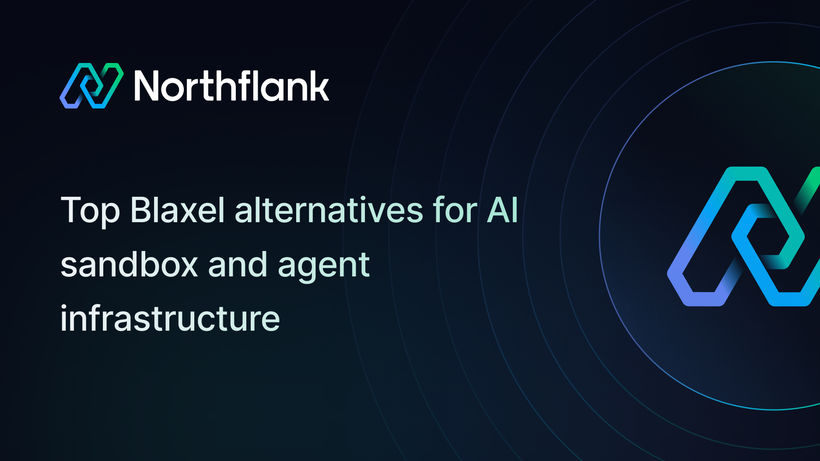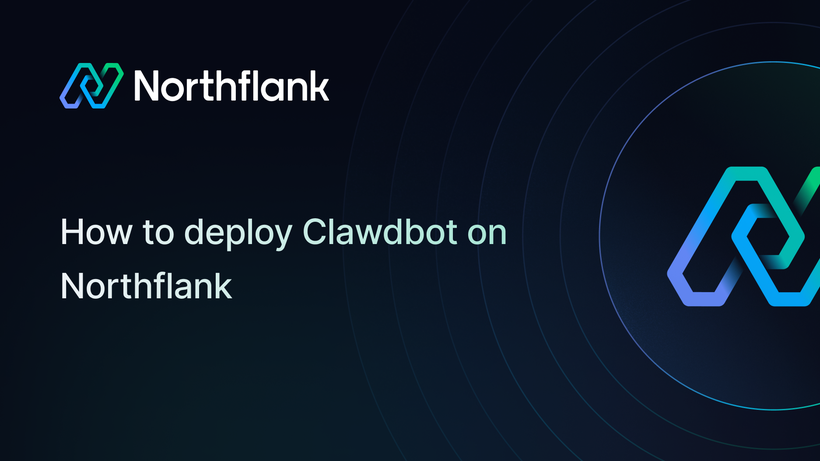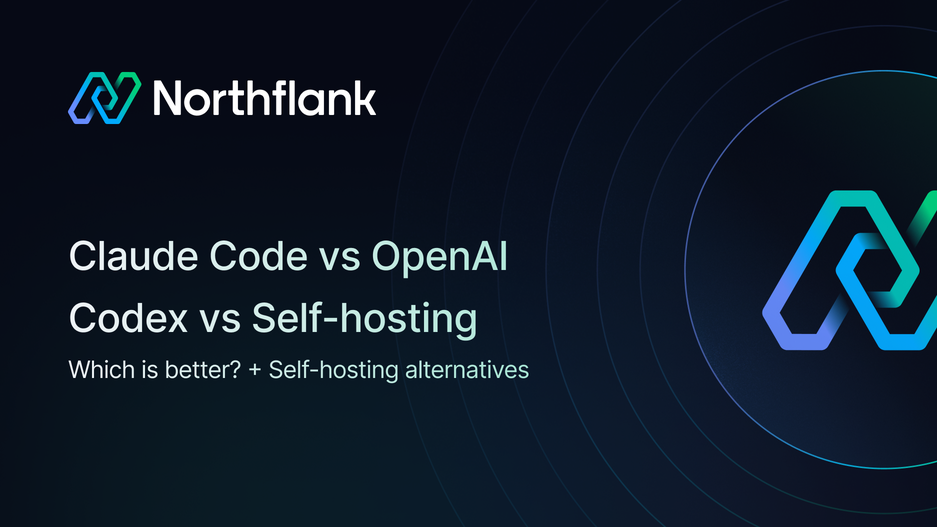

Claude Code vs OpenAI Codex: which is better in 2026?
Your development team needs an AI coding assistant, but which one should you use?
Anthropic's Claude Code and OpenAI's Codex CLI/Agent take fundamentally different approaches to AI-powered development.
For platform teams managing containerized environments on platforms like Northflank, understanding these differences is crucial for making the right infrastructure and tooling decisions.
We will compare both tools across their unique capabilities, integration options, setup, and cost factors to help you choose the right solution for your team.
Claude Code offers a developer-guided approach using a high-context, interactive CLI that deeply integrates with your local terminal and IDE. It excels at complex, single-task reasoning and refactoring, which is well-suited for developers who want to stay in control of their workflow.
OpenAI's Agent (formerly Codex) provides a cloud-based, autonomous environment for delegating end-to-end coding tasks. It operates in an isolated sandbox and autonomously generates pull requests, making it ideal for teams wanting to automate entire development workflows with less manual oversight.
Both tools now offer CLI interfaces and require paid subscriptions. Claude Code integrates with your local terminal and IDE, while Codex runs tasks in isolated cloud environments.
Note: If you're running containerized development environments, platforms like Northflank make it easy to manage the infrastructure needed to support either tool's API requirements and development workflows.
Northflank also enables self-hosting open source AI coding models for teams wanting complete data control and cost predictability.
Bottom line: Choose Claude Code for deep codebase analysis and local development workflows, or Codex for autonomous task delegation and cloud-based parallel processing.
Either way, platforms like Northflank can handle the underlying infrastructure complexity for both tools, plus offer self-hosting alternatives for complete cost and data control.
Before comparing these tools, it's important to understand what you're choosing between in 2026.
Claude Code is Anthropic's command-line interface that embeds its latest, most capable model (e.g., Claude 3.5 Sonnet or newer) directly in your terminal. It has deep codebase awareness and the ability to edit files and run commands directly in your local environment.
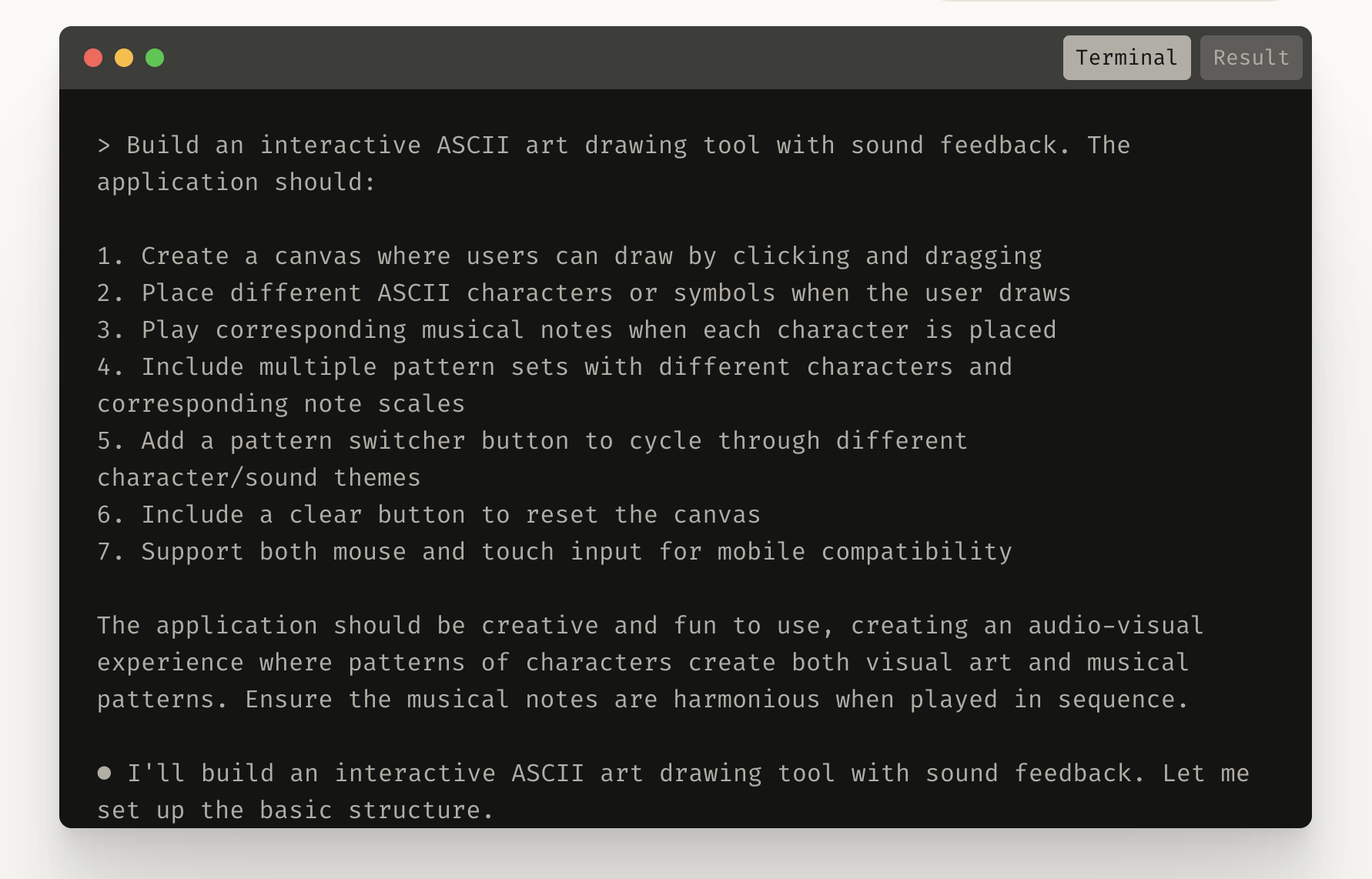 Claude code terminal from anthropic.com
Claude code terminal from anthropic.com
Compared to traditional coding assistants, Claude Code uses agentic search to understand your entire codebase without manual context selection and can make coordinated changes across multiple files. It does this by creating a context file that provides an overview of the project to the model.
OpenAI's AI coding agent is also branded as Codex, and in 2026, it is a multi-interface offering powered by their latest models, such as GPT-5 High. It includes:
- A cloud-based agent that works on many tasks asynchronously within isolated cloud sandbox environments. This agent is accessed via ChatGPT.
- A Codex CLI that runs locally on your computer.
- An IDE extension that provides deep integration with your development environment.
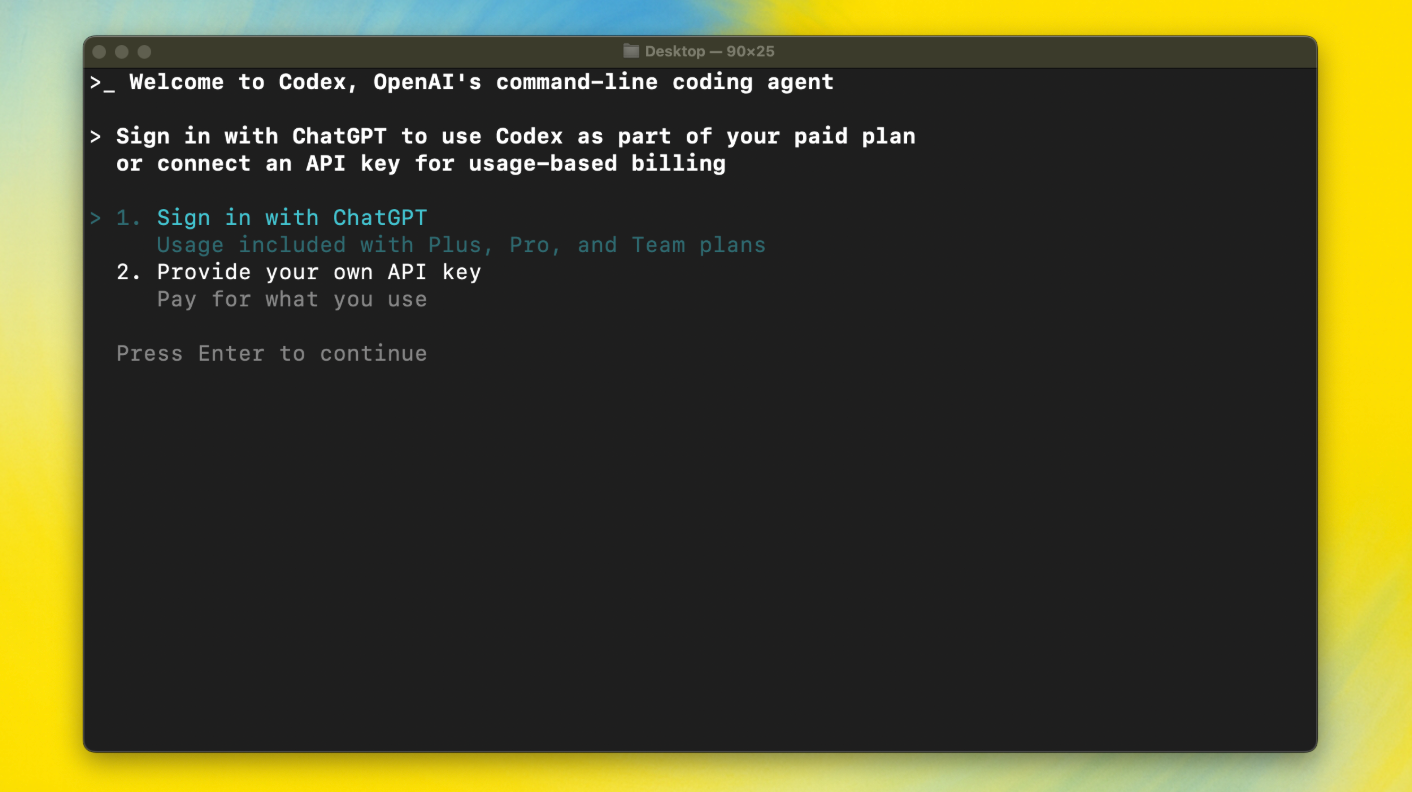 OpenAI Codex CLI from github.com/openai/codex
OpenAI Codex CLI from github.com/openai/codex
The major difference between Claude Code and OpenAI's Codex agent is this: Claude Code emphasizes a developer-in-the-loop, local workflow using the terminal, while OpenAI's Codex agent is designed for both local and autonomous, cloud-based task delegation that can handle asynchronous work.
When choosing AI coding assistants, the quality of the generated code and the approach to task execution directly impact your development velocity.
| Feature | Claude Code | OpenAI Codex (Agent) |
|---|---|---|
| AI model | Claude 3.5 Sonnet (or newer models) | Powered by GPT-5 High and Codex 1 |
| Training focus | Optimized for code understanding and generation through various techniques. | Trained with advanced methods, including reinforcement learning, to act like a software engineering agent. |
| Execution environment | Local terminal and IDE. | Both a cloud sandbox environment (accessed via ChatGPT) and a local CLI. |
| Multi-file coordination | High-context awareness allows coordinated changes across files via the local CLI. | Cloud agent can make coordinated changes and provides verifiable evidence of actions via logs and tests. |
| Best for | Developer-guided, interactive local workflows with full context. | Autonomous task delegation, especially for tasks that can run asynchronously in the cloud. |
Your development workflow determines how effectively you can leverage either tool's capabilities.
| Integration aspect | Claude Code | OpenAI Codex (Agent) |
|---|---|---|
| Access points | Terminal and IDE (VS Code, JetBrains) | ChatGPT sidebar, CLI, or IDE extensions (like VS Code and Cursor) |
| Context awareness | Deeply understands entire local codebase via agentic search and context files. | Cloud agent works in isolated environments preloaded with your repository. The CLI uses local context. |
| File modification | Makes coordinated, multi-file changes locally based on user prompts. Often requires explicit approval for critical changes. | Cloud agent commits changes in its isolated environment and can open pull requests for review. |
| Workflow approach | No context switching with strong local integration. Developer guides the agent in an interactive loop. | Independent, asynchronous task processing within isolated cloud sandboxes. Follows a delegation and review workflow. |
| Standards adaptation | Adapts to local coding standards and patterns by learning from the codebase. | Integrates with review, revision, and GitHub PR workflows, enforcing standards during the review process. |
| Infrastructure needs | Lower infrastructure overhead due to its local-first, API-driven model. | Higher isolation for concurrent, delegated tasks via its cloud-based architecture. |
Claude Code lives right inside your terminal, minimizing context switching and providing deep awareness of your entire codebase.
The Codex agent is accessible through various interfaces, with its cloud-based tasks processed independently in isolated sandboxes preloaded with your codebase. This allows for an autonomous, asynchronous workflow.
For teams using containerized development environments, both tools can be integrated. Claude Code's local approach requires less infrastructure overhead for developer-led tasks, while the Codex agent's cloud-based model provides better isolation for parallel, delegated workflows
If your team uses containerized development environments, you'll need to consider how to manage API access, costs, and security for AI coding tools like Claude Code and OpenAI's Codex agent. Northflank provides the platform to support these workflows at scale.
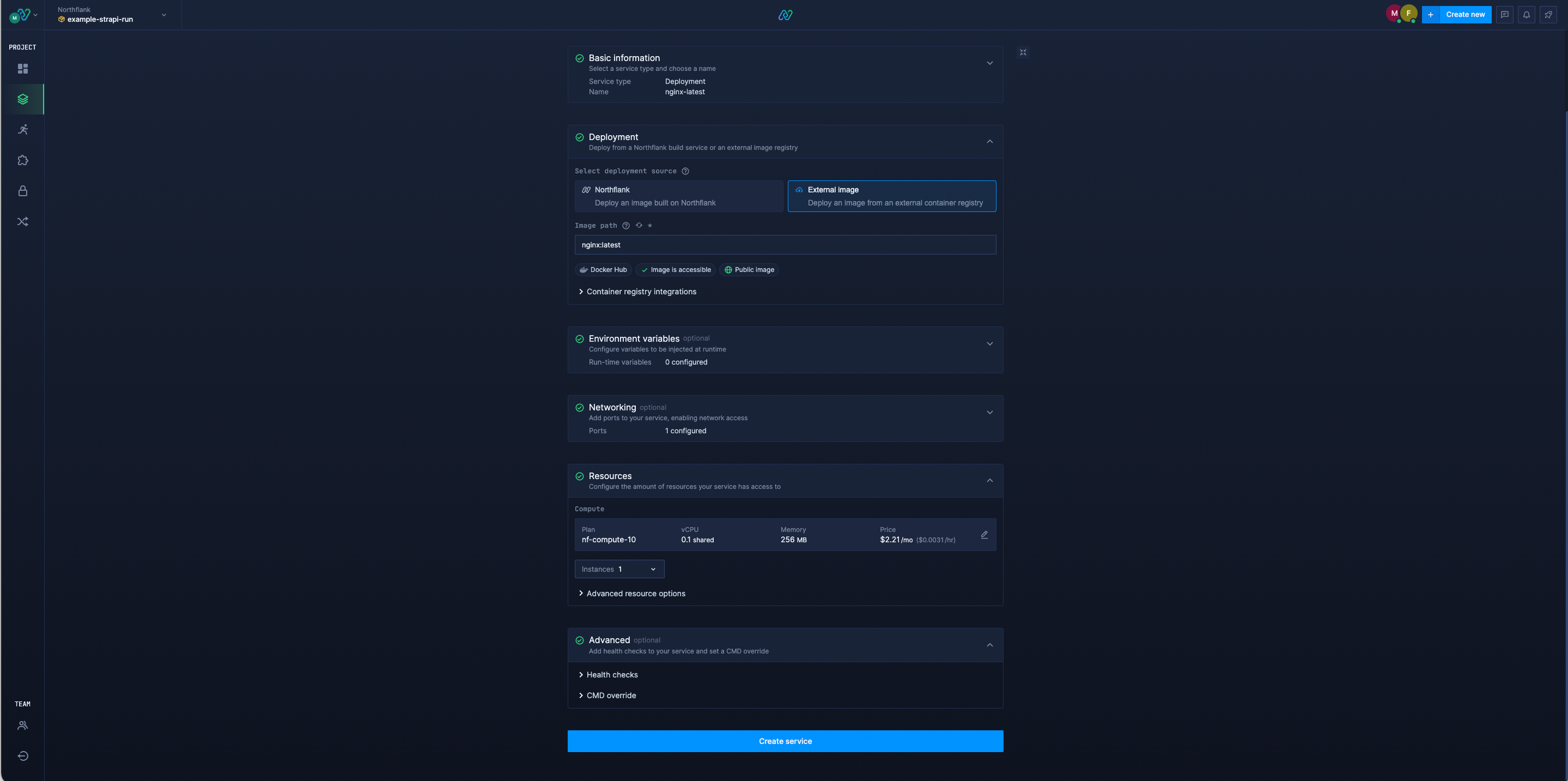 Northflank's service configuration interface for containerized AI coding environments
Northflank's service configuration interface for containerized AI coding environments
-
Centralized API management for any tool:
Both Claude Code and OpenAI's Codex agent require API keys for access. With Northflank, you can manage these API credentials centrally as secrets, injecting them securely into your containerized dev environments. This simplifies access control and makes it easy to monitor usage patterns across your teams.
-
Secure execution environments:
When using AI for code generation, it's crucial to use secure runtimes. Northflank offers secure sandboxing with microVMs, allowing you to run AI-generated code safely within isolated, disposable containers without risking your core infrastructure. (See secure runtime environments with microVMs and proper sandboxing.)
-
Optimizing Workflows:
- For Claude Code users, teams can use Northflank to manage the infrastructure for their containerized development environments, ensuring stable API connectivity and consistent dependencies. This supports the developer's local workflow by providing a pre-configured, reliable environment for the Claude Code CLI.
- For OpenAI's Codex agent, teams can leverage Northflank to orchestrate the backend for their automated pipelines. The platform can deploy and manage the secure sandboxes used by the Codex agent, allowing you to delegate and monitor asynchronous coding tasks at scale.
Note: This approach is most relevant for teams already invested in containerized development. For local-only workflows, container orchestration is not required.
For teams prioritizing complete control, privacy, and cost management, self-hosting open-source AI models is a powerful alternative to third-party services like Claude Code and OpenAI's Codex agent. Northflank provides the platform to make this process seamless for containerized teams.
- Complete data control: Keep all code analysis and data processing in-house to meet strict privacy and compliance requirements.
- Cost predictability: Eliminate unpredictable per-token costs. Instead, pay for your infrastructure, which becomes more cost-effective as usage scales.
- Customization: Tailor and fine-tune models on your specific codebase to achieve superior performance for your unique development tasks.
- Workflow integration: Integrate open-source models into your existing containerized workloads, allowing your tools to scale alongside your applications.
- CodeLlama - Meta's foundational, code-focused language model.
- DeepSeek Coder - A high-performance model with advanced reasoning capabilities (check out our DeepSeek R1 setup guide and stack templates for easy deployment.)
- WizardCoder - A powerful model known for its high-quality instruction-following capabilities.
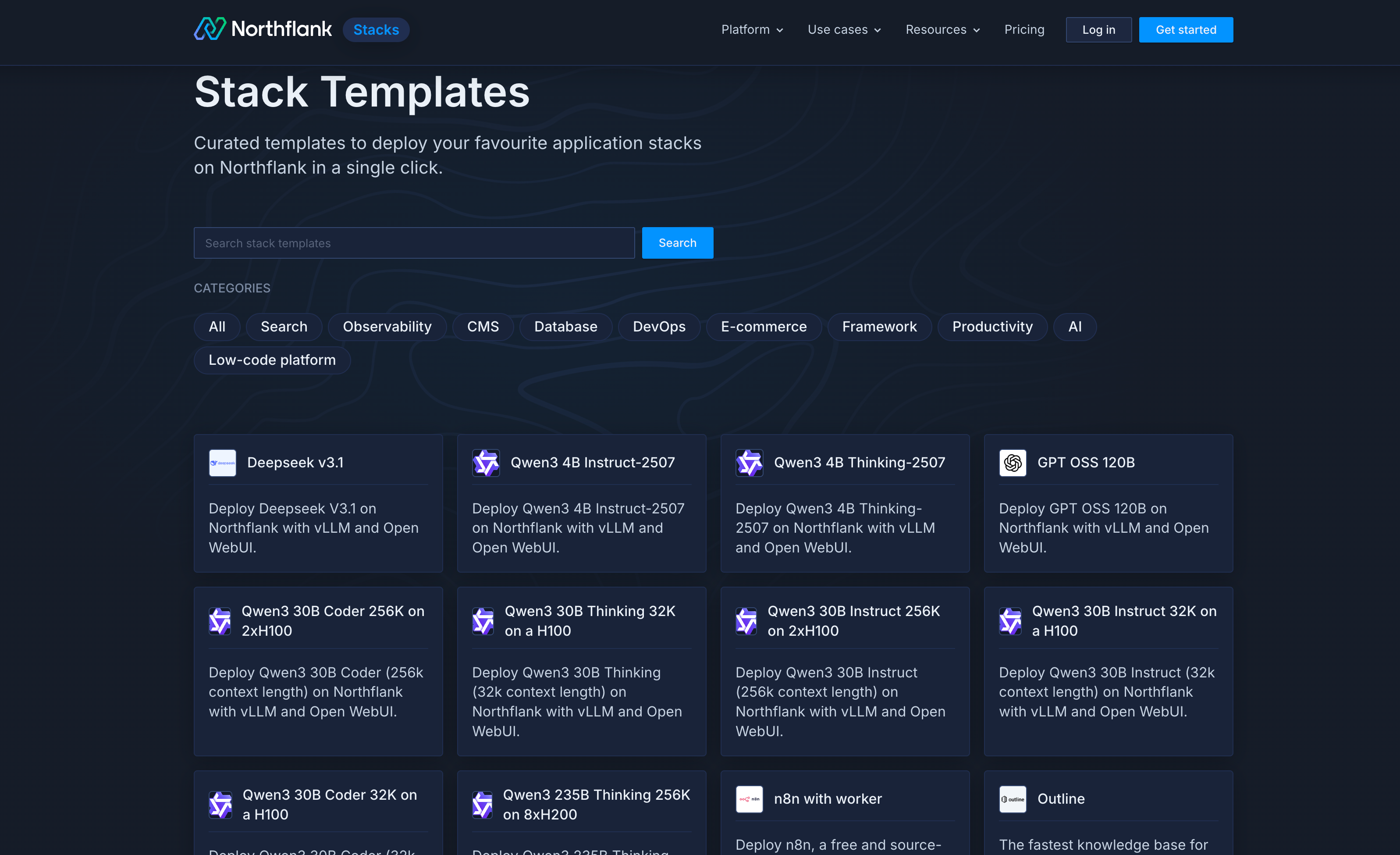 Northflank’s stack templates - https://northflank.com/stacks
Northflank’s stack templates - https://northflank.com/stacks
- Zed Editor - Supports connecting to self-hosted models via OpenAI-compatible APIs
- JetBrains IDEs - Can integrate with local AI coding assistants through plugins and API configurations
- VS Code - Multiple extensions available for connecting to self-hosted coding models
- One-Click Deployment: Use our pre-configured stack templates to deploy open-source models with a single click.
- High-Performance Serving: Follow our vLLM setup guide to serve models with OpenAI-compatible APIs, ensuring fast and efficient inference.
- Complete Control: With our managed container platform, you can scale resources, monitor performance, and manage all aspects of your self-hosted AI infrastructure. (See this self-hosting AI models guide)
The balance between convenience (with SaaS options) and control (with self-hosting) depends on your team's specific needs. For teams already running containerized workloads, Northflank makes self-hosting a compelling and cost-effective option for achieving complete control over your AI coding infrastructure.
Beyond self-hosting, teams need a practical implementation strategy for proprietary AI coding solutions.
Setting up these tools across an engineering organization involves more than just individual developer preferences.
- Installation: Requires installation via npm (
npm install -g @anthropic-ai/claude-code) or by downloading the appropriate binary from Anthropic's console or GitHub releases. - Configuration: A one-time OAuth process links the CLI to your Anthropic account, providing API access for the entire session.
- Environment: Runs directly in the developer's terminal and IDE, processing tasks with a high degree of local context awareness.
- Installation: The Codex CLI is installed via npm (
npm install -g @openai/codeex), requiring Node.js. The cloud agent is accessed directly via the ChatGPT interface. - Configuration: Requires an OpenAI API key to be set as an environment variable (
OPENAI_API_KEY) for the CLI. Access to the agent is tied to a ChatGPT Plus, Pro, Team, or Enterprise subscription. - Management: Provides centralized billing and usage analytics via the OpenAI API platform, allowing enterprise teams to manage usage effectively.
- Claude Code: Operates primarily in your local environment, but sends code context (the files it reads) to Anthropic's API for processing. While much remains local, sensitive code is still transmitted.
- OpenAI's Codex agent: The cloud agent runs in isolated sandboxes and is explicitly designed to handle your repository data. The Codex CLI processes and transmits data from your local machine, similar to Claude Code.
- Your evaluation: Both approaches involve transmitting code to external services. Teams must evaluate their security and compliance requirements against the data handling policies of Anthropic and OpenAI
After understanding setup requirements, your team needs to budget for the ongoing costs of whichever AI coding solution you choose.
Understanding the total cost of ownership helps you make informed decisions about adopting AI coding tools.
Claude Code requires an Anthropic subscription. As of September 2026, the plans are:
- Pro plan (~$20/month): Includes access to the Claude 3.5 Sonnet model and is suitable for light coding tasks. Weekly and rolling 5-hour usage limits apply.
- Max plan (starting at ~$100/month): Includes higher limits and access to more powerful models, such as Claude Opus (often designated by a number, e.g., Opus 4). A weekly usage ceiling limits heavy usage.
- Pay-as-you-go API pricing: Available for enterprise users, billed based on token usage.
OpenAI's agentic coding tools are included with paid subscriptions:
- ChatGPT Plus (~$20/month): Provides basic access to AI coding features within the standard ChatGPT interface.
- ChatGPT Team/Enterprise: Required for dedicated workspaces, centralized billing, and enhanced security for teams. The full-featured Codex agent, which runs in isolated cloud sandboxes, is most often associated with these higher-tier plans or a dedicated developer account on the OpenAI platform.
- API Usage: The local Codex CLI and other agentic features are billed separately based on API token usage, requiring a payment method on file.
Hidden costs to factor in:
- Onboarding time for team training and setup
- Infrastructure setup and ongoing maintenance
- Usage monitoring and cost management overhead
- Potential productivity loss during tool transition
Your total investment calculation should include these operational costs alongside the subscription or API fees when determining which platform provides better value for your team's specific usage patterns.
Your decision ultimately depends on your team's development patterns, infrastructure requirements, and data privacy needs.
Choose Claude Code if:
- You want deep local codebase integration and analysis.
- Your team prefers working directly in terminal and IDE environments.
- You need coordinated multi-file edits driven by a developer-in-the-loop workflow.
- Local control over your code and an interactive development process are your top priorities.
Choose OpenAI Codex if:
- You want to delegate entire coding workflows to autonomous, cloud-based agents.
- Your team benefits from asynchronously delegating independent tasks that run in isolated environments.
- You prefer a workflow with cloud-based processing, detailed task logging, and automated pull request generation.
- Your team is already integrated with the OpenAI ecosystem via ChatGPT Team or Enterprise plans
For platform teams managing containerized development environments, both tools can be effectively integrated using modern container orchestration platforms that handle the underlying infrastructure complexity, API management, and monitoring
Both Claude Code and OpenAI's Codex agent represent significant advances in AI-assisted development, but they serve different use cases and team structures.
- Claude Code is a deep codebase collaborator optimized for interactive, local development workflows.
- The Codex agent provides autonomous task delegation, running tasks asynchronously in isolated cloud environments.
Your choice should align with your team's workflow preferences, infrastructure capabilities, and development methodology.
Rather than viewing this as an either-or decision, some teams find value in using both tools for different scenarios - using Claude Code for deep codebase analysis and local development, while relying on the Codex agent for autonomous task delegation and asynchronous workflows.
For platform teams managing containerized development environments, both tools can be effectively integrated using modern container orchestration platforms that handle the underlying infrastructure complexity.
If you're looking into AI coding tools further, these guides can help with your implementation:
- Claude Code vs Cursor comparison - Compare Claude Code against another popular AI coding assistant
- Claude rate limits, Claude Code pricing & cost - Detailed breakdown of Claude Code costs and usage optimization
- Secure runtime for codegen tools - Security requirements when setting up AI coding tools at scale
- Open source LLMs: complete developer's guide to deployment - Alternative approaches using open source models
- Self-hosting AI models guide - Comprehensive guide to running your own AI infrastructure
